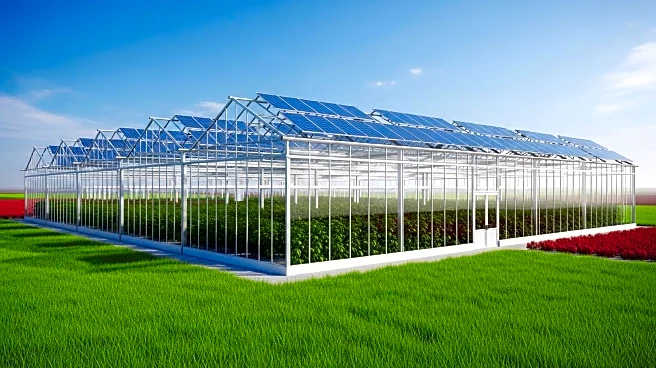What's Happening?
Sensei Farms, co-founded by Larry Ellison, has acquired a 25-acre site in Lockhart, Texas, which includes a 283,000 sq. ft. greenhouse. This expansion is part of a broader initiative to enhance sustainable agriculture practices by integrating advanced technologies into farming operations. The acquisition is expected to support the growth of the Agriculture Technology-as-a-Service market, which reached $2.6 billion in 2022 and is projected to grow to $12.3 billion by 2031. The market is experiencing a compound annual growth rate (CAGR) of 21.5% during the forecast period from 2024 to 2031. Other developments in the sector include investments in smart-box technology and autonomous machines for harvesting, aimed at addressing labor shortages and improving efficiency.
Why It's Important?
The expansion of Sensei Farms in Texas signifies a growing trend towards sustainable agriculture practices in the U.S. By integrating advanced technologies, such as precision farming tools and robotics, the initiative aims to improve efficiency, crop yield, and sustainability in farming operations. This development is crucial as it addresses challenges like labor shortages and the need for more efficient farming practices. The Agriculture Technology-as-a-Service market is poised for significant growth, driven by investments in technology that enhance decision-making and reduce operating costs. Stakeholders in the agriculture sector, including farmers and technology providers, stand to benefit from these advancements, which could lead to increased productivity and profitability.
What's Next?
The Agriculture Technology-as-a-Service market is expected to continue its growth trajectory, with key players investing in technologies that support sustainable farming practices. Future developments may include further acquisitions and investments in smart farming solutions, as well as collaborations between technology providers and agricultural businesses. As the market expands, stakeholders will likely focus on addressing challenges such as labor shortages and environmental sustainability. The integration of advanced technologies into farming operations is expected to drive efficiency and productivity, potentially transforming the agriculture industry in the U.S.
Beyond the Headlines
The shift towards technology-driven agriculture practices raises important ethical and environmental considerations. As farms become more reliant on technology, issues such as data privacy, the impact on traditional farming jobs, and the environmental footprint of technological solutions may come to the forefront. Additionally, the long-term sustainability of these practices will depend on balancing technological advancements with ecological preservation. Stakeholders will need to address these concerns to ensure that the benefits of technology in agriculture are realized without compromising ethical and environmental standards.











